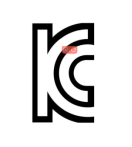Asia Certification
Position: Home > International Certification > Asia Certification
Korea KC Certification
KC certification introduction, KC certification mark:

KC certification, in order to enable consumers to more clearly understand the certification mark on the purchased products, as well as reduce the burden of various certification costs for product manufacturers, the Korean Institute of Technical Standards (KATS) announced on August 20, 2008 that July 2009 to December 2010 to implement a new national unified certification mark, Named "KC Mark" logo.
The new logo is called KC Mark, which stands for Korea Certification. The existing 13 mandatory symbols were finally unified under this new symbol.
One result of this initiative is to reduce suppliers' spending on certification fees, and to enable Korea KC Mark to gradually become a world brand certification. However, there is a drawback, the recently promulgated KCC logo, which will only be in effect for a few years, has finally been unified under this new KC logo.
The program was first implemented by the Knowledge Economy Ministry in July 2009 and is expected to be expanded to all ministries by the end of 2010. The implementation plan of the KC logo is as follows: December 2008: amending the Basic Law of National Standards and its enforcement Decree; July 2009: The Ministry of Knowledge Economy began to implement and adopt the national unified KC logo; January 2009 - December 2010: Amendment of laws related to standard certification; January 2011: KC mark applied to all certifications.
Product catalog
KC Mark Certification Products List
According to the "Korean Electrical products Safety Management Law", since January 1, 2009, electrical products safety certification is divided into mandatory certification and self-regulatory (voluntary) certification.
Mandatory certification means that all electronic products belonging to mandatory products must obtain KC Mark certification before they can be sold in the Korean market. Subject to annual factory review and product sampling testing.
Self-regulatory (voluntary) certification means that all electronic products that are voluntary products only need to be tested to obtain a certificate, and do not need to be reviewed by the factory. The certificate is valid for 5 years.
Review requirement
KC Certified factory review First audit factory requirements:
South Korea's safety law requires an initial factory inspection of a plant after an application is accepted for authorization. Conduct a preliminary evaluation of the quality control system of the factory in accordance with the requirements of the safety law, which involves the following aspects:
The Factory shall produce certified products consistent with samples certified by the certification body in accordance with the requirements of product certification implementation planning and factory quality assurance capabilities. According to the laws related to safety certification in Korea and the relevant regulations of the Korea Institute of Industrial Technology (KTL), your factory should have the following documented procedures or regulations, which should be compatible with the factory quality management and product quality control:
1) Product change control procedures (example: After the certification body approves the change declaration of the certified product, the corresponding department shall formulate the corresponding technical documents in strict accordance with the approved change content and issue them to the relevant departments to correctly implement the change of the certified product. A certification mark cannot be applied to the changed product without approval.)
2) Document and data control procedures
3) Quality record control procedures {should include a record retention period of at least 3 years (only incoming, routine and operational inspection records)}
4) Routine inspection and confirmation inspection procedures
5) Nonconforming product control procedures
6) Inspection or verification procedures for key components and materials
7) Internal quality audit procedures
8) Process operation instructions Inspection standards, instruments and equipment operating procedures, management systems and other procedures the factory shall keep at least the following quality records to confirm that the factory has indeed carried out all production inspections and production tests, and the quality records shall be true and effective
9) Routine product inspection and confirmation of inspection records; Incoming inspection/verification records of key components and materials and conformity certificates from suppliers
① Records of regular calibration or verification of inspection and test equipment;
② Routine inspection and confirmation (operation) inspection records;
③ Daily inspection records of safety equipment on the production line (workshop);
④ Disposal records of nonconforming products (purchase, routine and operation);
⑤ Record of internal audit;
⑥ Records of corrective actions taken on customer complaints;
⑦ Corrective record of unqualified operation inspection;
Annual factory audit requirements:
After the certificate is authorized, the certification body will conduct an annual follow-up review of the factory, the main purpose of which is to check the consistency of the quality control system of the factory and whether it can continue to meet the standards of the safety law.、
The annual factory review is divided into two parts
1) The requirements and contents of quality documents, quality records, and related contents of the manufacturing site are basically the same as those of the initial review.
2) It is necessary to confirm the consistency of all KC Mark authorized products in the factory. According to the attached page of the product's authorization certificate (list of key components), confirm the key components, materials, circuits, and structures of the certified products to see whether they are consistent.
Sampling requirements:
A total of 216 products are included in the KC Mark compulsory certification, and the Korean Safety law requires that all products be sampled annually, so each product has to be sampled once a year.
The sampling method is;
When there is production or inventory on site, the inspector seals the sample, and the factory sends the sample to the designated address within 3 months.
If there is no production or stock at the time of the factory audit, the factory must send the specified sample to the specified address within 6 months.


